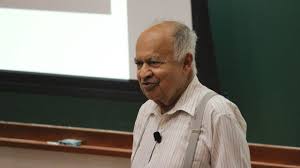
Jayant Vishnu Narlikar, one of India’s most eminent astrophysicists and a pioneering figure in science, passed away at the age of 87 on Tuesday in Pune. Known for his groundbreaking contributions to cosmology and his passionate efforts in science communication, Narlikar leaves behind a lasting legacy in Indian and global scientific communities.
Mr. Narlikar was the founding director of the Inter-University Centre for Astronomy and Astrophysics (IUCAA) in Pune, which he led to international prominence. Even after his retirement in 2003, he remained an emeritus professor and continued to inspire generations of scientists and students.
Prime Minister Narendra Modi expressed his condolences, calling Narlikar’s death a “monumental loss to the scientific community.” In a statement on social media, the Prime Minister highlighted Narlikar’s pioneering theoretical work in astrophysics and his role as an institution builder. Modi also praised his efforts to make science accessible to the public through his writings and broadcasts.
Early Life and Academic Journey
Born on July 19, 1938, in Kolhapur, Maharashtra, Jayant Narlikar grew up on the campus of Banaras Hindu University, where his father was a mathematics professor. He completed his B.Sc. from BHU in 1957 before moving to Cambridge University for higher studies.
At Cambridge, Narlikar excelled academically, winning prestigious awards such as the Tyson Medal, Smith’s Prize, and the Adams Prize. He earned his PhD in 1963 and became a Fellow of King’s College. His research specialized in astronomy and astrophysics, where he made significant theoretical contributions.
Career Highlights and Scientific Contributions
Narlikar returned to India in 1972 to join the Tata Institute of Fundamental Research (TIFR), where he headed the Theoretical Astrophysics Group. In 1988, he founded the IUCAA, shaping it into a leading center for astronomical research.
He was internationally recognized for his alternative cosmological models, which challenged the dominant Big Bang theory. His work on gravity, Mach’s Principle, and quantum cosmology gained global attention. Between 1994 and 1997, he served as President of the Cosmology Commission of the International Astronomical Union.
One of his remarkable scientific projects involved collecting microorganisms from the upper atmosphere, leading to discoveries that suggested Earth might be continuously bombarded by life forms from space—hinting at the possibility of extraterrestrial origins of life.
Awards and Honors
Jayant Narlikar was honored with India’s third-highest civilian award, the Padma Bhushan, in 1965 at the young age of 26. Later, he received the Padma Vibhushan in 2004, one of the nation’s highest honors.
He was a Fellow of all three major Indian science academies, as well as the Royal Astronomical Society of London and the Third World Academy of Sciences. In 1996, UNESCO awarded him the Kalinga Prize for his outstanding work in science popularization.
Legacy and Family
Narlikar is survived by his wife, mathematician Mangala Rajwade, and their three daughters — Geeta, Girija, and Leelavati — all of whom are engaged in scientific research.
Even in his later years, Mr. Narlikar remained active in sharing science with the public, maintaining a popular blog where he recounted his experiences and insights.
Jayant Vishnu Narlikar’s life and work embody a rare blend of scientific rigor, innovative thinking, and dedication to public education. His contributions have left an indelible mark on Indian science, and his legacy will continue to inspire future generations.
Sources By Agencies

